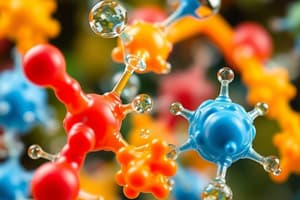Podcast
Questions and Answers
What is the main function of enzymes in biochemical reactions?
What is the main function of enzymes in biochemical reactions?
- Regulate the rate of biochemical reactions (correct)
- Terminate biochemical reactions
- Have no role in biochemical reactions
- Initiate biochemical reactions
What type of molecules are required for the activity of certain conjugated enzymes?
What type of molecules are required for the activity of certain conjugated enzymes?
- Carbohydrates
- Proteins
- Lipids
- Organic and inorganic molecules (correct)
Which type of enzymes retain their original names with no hint of the associated enzymatic reaction?
Which type of enzymes retain their original names with no hint of the associated enzymatic reaction?
- Sucrase and trypsin
- Lactate dehydrogenase and adenylyl cyclase
- Glucosidase and urease
- Trypsin and pepsin (correct)
Which type of enzymes retain their original names with no hint of the associated enzymatic reaction?
Which type of enzymes retain their original names with no hint of the associated enzymatic reaction?
What is the main function of enzymes in biochemical reactions?
What is the main function of enzymes in biochemical reactions?
Match the following with their correct description:
Match the following with their correct description:
Match the following terms with their correct definition:
Match the following terms with their correct definition:
Match the following enzyme names with their correct nomenclature:
Match the following enzyme names with their correct nomenclature:
Flashcards are hidden until you start studying
Study Notes
Enzymes and Their Functions
- Enzymes act as biological catalysts, speeding up biochemical reactions by lowering activation energy.
- They play a crucial role in metabolic pathways, facilitating digestion, energy production, and biosynthesis.
Conjugated Enzymes
- Conjugated enzymes require specific non-protein molecules known as cofactors or coenzymes for their activity.
- Cofactors can include metal ions (e.g., zinc, magnesium) while coenzymes are often derived from vitamins (e.g., NAD, FAD).
Enzyme Nomenclature
- Enzymes that retain their original names without indicating the associated reaction are typically known as 'systematic' or 'recommended' names.
- This type often does not reflect the specific substrate or type of chemical reaction catalyzed.
Enzyme Descriptions and Definitions
- Accurate matching of terms to definitions is essential in understanding enzyme functions, mechanisms, and classifications.
- Familiarity with nomenclature helps to understand enzymatic reactions and their biological significance.
Studying That Suits You
Use AI to generate personalized quizzes and flashcards to suit your learning preferences.



